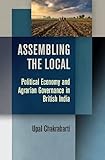Assembling the Local : Political Economy and Agrarian Governance in British India / Upal Chakrabarti.
Material type: TextSeries: Intellectual History of the Modern AgePublisher: Philadelphia : University of Pennsylvania Press, [2021]Copyright date: ©2021Description: 1 online resource (288 p.)Content type:
TextSeries: Intellectual History of the Modern AgePublisher: Philadelphia : University of Pennsylvania Press, [2021]Copyright date: ©2021Description: 1 online resource (288 p.)Content type: - 9780812297713
- 338.2 23
- online - DeGruyter
| Item type | Current library | Call number | URL | Status | Notes | Barcode | |
|---|---|---|---|---|---|---|---|
 eBook
eBook
|
Biblioteca "Angelicum" Pont. Univ. S.Tommaso d'Aquino Nuvola online | online - DeGruyter (Browse shelf(Opens below)) | Online access | Not for loan (Accesso limitato) | Accesso per gli utenti autorizzati / Access for authorized users | (dgr)9780812297713 |
Browsing Biblioteca "Angelicum" Pont. Univ. S.Tommaso d'Aquino shelves, Shelving location: Nuvola online Close shelf browser (Hides shelf browser)

|

|

|

|

|

|

|
||
| online - DeGruyter The Book of Books : Biblical Interpretation, Literary Culture, and the Political Imagination from Erasmus to Milton / | online - DeGruyter Evading International Norms : Race and Rights in the Shadow of Legality / | online - DeGruyter The Erotics of Materialism : Lucretius and Early Modern Poetics / | online - DeGruyter Assembling the Local : Political Economy and Agrarian Governance in British India / | online - DeGruyter Artificial Life After Frankenstein / | online - DeGruyter In Defense of Populism : Protest and American Democracy / | online - DeGruyter The Loss of the "Trades Increase" : An Early Modern Maritime Catastrophe / |
Frontmatter -- contents -- Introduction. universality as difference -- chapter 1. science, Method, and Indigeneity: Political economy -- chapter 2. the trace of the Local: rent -- chapter 3. temporal geographies of Power: Property -- chapter 4. grounding governance: Village -- chapter 5. disputes in the Locality: Peasants -- conclusion. rewriting Production -- notes -- Bibliography -- Index -- Acknowledgments
restricted access online access with authorization star
http://purl.org/coar/access_right/c_16ec
In 1817, in a region of the eastern coast of British India then known as Cuttack, a group of Paiks, the area's landed militia, began agitating against the East India Company's government, burning down government buildings and looting the treasury. While the attacks were initially understood as an attempt to return the territory's native ruler to power, investigations following the rebellion's suppression traced the cause back to the introduction of a model of revenue governance unsuited to local conditions. Elsewhere in British India, throughout the first half of the nineteenth century, interregional debates over revenue settlement models and property disputes in villages revealed an array of practices of governance that negotiated with the problem of their applicability to local conditions. And at the same time in Britain, the dominant Ricardian conception of political economy was being challenged by thinkers like Richard Jones and William Whewell, who sought to make political economy an inductive science, capable of analyzing the real world.Through analyses of these three interrelated moments in British imperial history, Upal Chakrabarti's Assembling the Local engages with articulations of the "local" on multiple theoretical and empirical fronts, weaving them into a complex reflection on the problem of difference and a critical commentary on connections between political economy, agrarian property, and governance. Chakrabarti argues that the "local" should be reconceptualized as an abstract machine, central to the construction of the universal, namely, the establishment of political economy as a form of governance in nineteenth-century British India.
Mode of access: Internet via World Wide Web.
In English.
Description based on online resource; title from PDF title page (publisher's Web site, viewed 01. Dez 2022)


